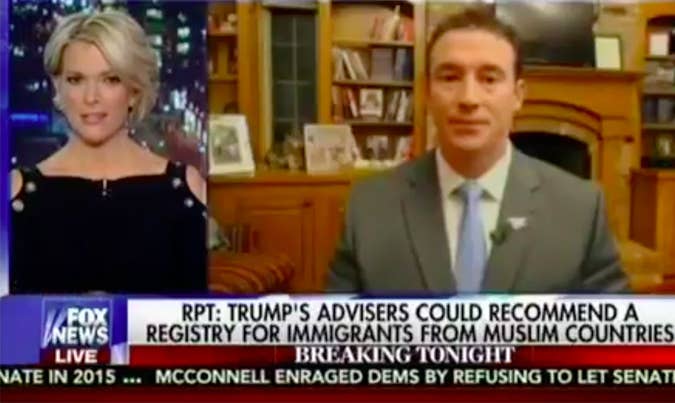
A well-known Donald Trump surrogate alarmed viewers when he said the internment of Japanese-Americans during World War II was a legal precedent for a registry of Muslim immigrants.
Carl Higbie, spokesman of the pro-Trump Great America political action committee (PAC) and a former Navy Seal, said in an interview Wednesday with Fox News in response to reports of the proposed registry:
To be perfectly honest, it is legal. They say it will hold constitutional muster. I know the ACLU [American Civil Liberties Union] is going to challenge it, but I think it will pass. We've done it with Iran back a while ago. We did it during World War II with Japanese. Call it what you will, maybe wrong.
Megyn Kelly, the Fox News anchor, picked up on the statement and challenged Higbie, saying: "You're not proposing we go back to the days of internment camps, I hope?"

Visibly taken aback, Kelly told Higbie: "You can't be citing Japanese internment camps as precedent for anything the president-elect is going to do."
Higbie responded: "Look, the president needs to protect America first and if that means having people that are not protected under our constitution have some sort of registry so we can understand ... until we can identify the true threat and where it's coming from, I support it."
The Fox News host ended the interview by saying: "You get the protections once you come here."
The interview was widely shared after Brendan Karet, a researcher at the watchdog Media Matters for America, tweeted the clip – which at the time of writing has been retweeted around 16,000 times.
Trump surrogates are already citing Japanese internment camps from WW II as "precedent" for Muslim registry
His comments came after Kris Kobach, the Kansas secretary of state, who was involved in anti-immigration efforts, revealed in an interview with Reuters that Trump's policy advisers were discussing drafting a proposal to reinstate a registry for immigrants from Muslim countries.
Kelly later tweeted:
.@CarlHigbie: "People outside of this country are not protected under the same constitutional rights as we are in America." #KellyFile
Which led to this ~interesting~ exchange:
@ryepolisciguy @megynkelly wrong
Viewers shocked by Higbie's comments wrote on social media that what he said had no place in America:
@CarlHigbie hate and discord have no place in America so you might wanna learn that!
Hey @CarlHigbie, you know what else is a precedent in American history? CIVIL RIGHTS.
@CarlHigbie people in the United States are not protected by the Constitution? Really? In whose universe? Oh yes, I forgot #Trump Universe
Trumpets citing Japanese internment camps as "precedent" for Muslims Only a small step from "internment" camps to… https://t.co/LoYvEhLQgw
He defended his comments Thursday on the John Gibson radio show.
"I simply was making the case that there is precedent for presidents doing things that are unprecedented in order to protect the nation, whether they be right or wrong," Higbie said.
After host Gibson advised Higbie that he "would do best not to bring up Japan at all," Higbie said the Supreme Court had upheld the constitutionality of internment and equated internment to Democrats advocating for slavery in the 1800s.
Nathaniel Meyersohn contributed to this report.
